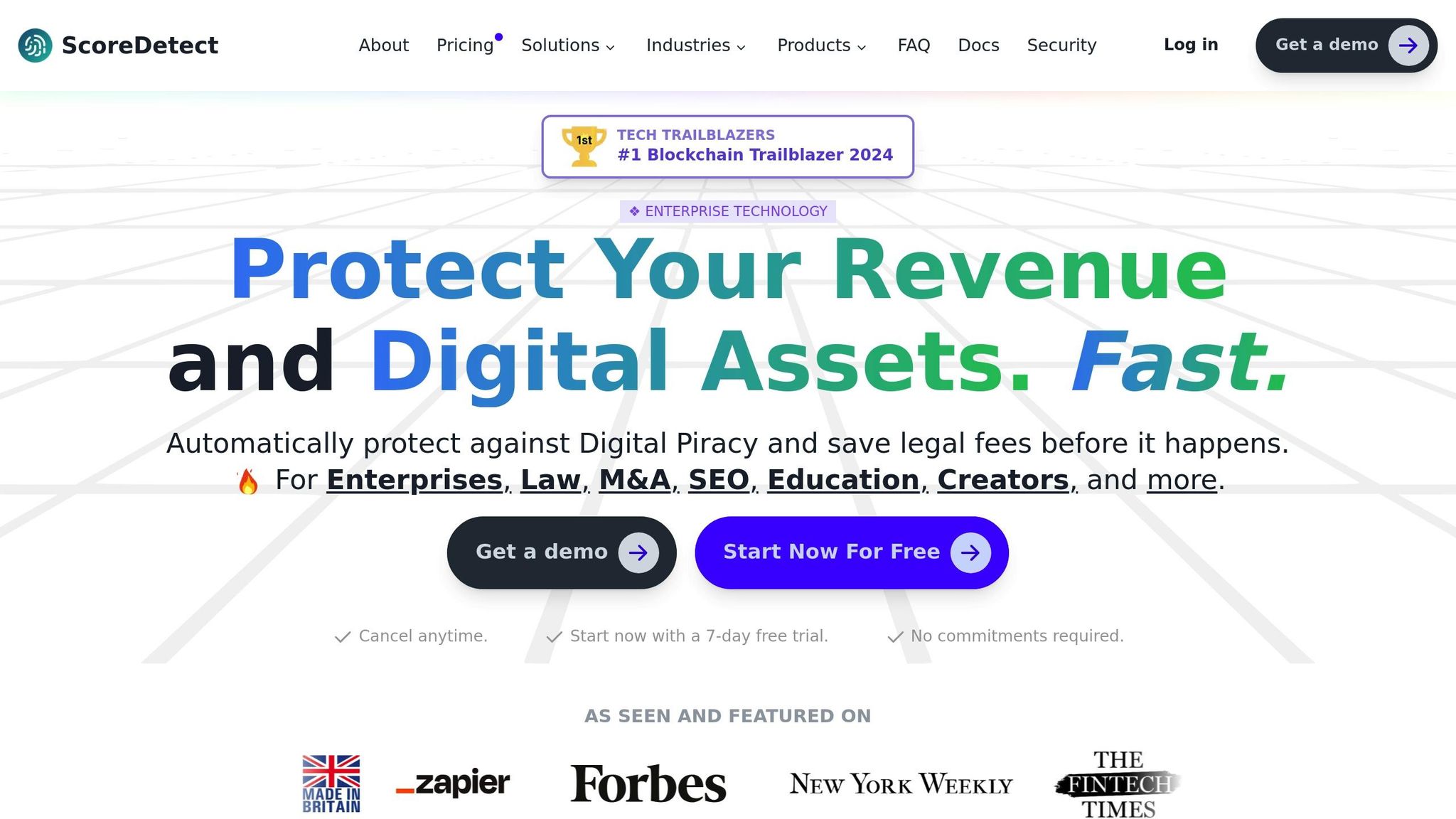Blockchain certifications are transforming how digital asset platforms manage compliance. By offering tamper-proof records, automated processes, and enhanced security, these certifications simplify regulatory approvals and reduce dependency on traditional audits. They help platforms meet complex requirements like KYC, AML, and data protection laws while maintaining secure, verifiable audit trails.
Key takeaways include:
- Improved Compliance: Immutable records ensure transparency and simplify regulatory reviews.
- Enhanced Security: Features like multi-signature verifications and access logs lower risks.
- Technology Integration: Tools like ScoreDetect automate workflows and create timestamped, verifiable records.
As regulations evolve, adopting blockchain certifications can help platforms reduce fines, build trust, and stay competitive in a compliance-driven environment.
Understanding Blockchain Certifications and Compliance Requirements
What Are Blockchain Certifications
Blockchain certifications serve as proof that a platform adheres to specific security and operational standards tailored to blockchain technology. Unlike traditional certifications, these focus on the unique aspects of decentralized systems. They evaluate blockchain-specific controls, including the decentralized governance structures that underpin these networks. The process often involves in-depth code reviews and infrastructure assessments to ensure the platform meets stringent security and performance benchmarks. This thorough evaluation lays the groundwork for tackling various regulatory challenges.
Compliance Requirements for Digital Asset Platforms
In addition to adhering to blockchain standards, digital asset platforms face intricate regulatory demands. These platforms must navigate a patchwork of regulations that differ by jurisdiction. In the U.S., for example, platforms are required to comply with rules set by agencies like the SEC, CFTC, and FinCEN. This often includes implementing robust KYC (Know Your Customer) and AML (Anti-Money Laundering) measures to verify user identities and track transactions.
On top of financial regulations, data protection laws such as the California Consumer Privacy Act (CCPA) impose additional obligations. These laws emphasize transparency in how user data is handled and prioritize safeguarding user privacy. Cybersecurity remains another critical area, as platforms must protect digital assets from threats while ensuring consistent operational reliability.
Blockchain certifications play a key role in simplifying these compliance challenges. By standardizing controls and leveraging the secure record-keeping and transparent validation that blockchain technology provides, these certifications help digital asset platforms address regulatory and operational requirements more effectively across different jurisdictions.
Impact of blockchain on regulatory compliance | TrustTalks – Ep 30 | Security and GRC Podcast
Research Results: How Certifications Improve Compliance
Recent research highlights that blockchain certifications play a key role in improving compliance by utilizing unchangeable records to reliably document all compliance-related activities. This approach strengthens both regulatory oversight and operational security.
Better Regulatory Compliance
Blockchain’s resistance to tampering and fraud enables platforms to maintain unalterable audit trails. These secure records ensure compliance activities are tracked and verified without the risk of manipulation [2]. Compared to traditional record-keeping methods, this level of documentation simplifies oversight and review processes. Beyond just streamlining these processes, blockchain also reinforces the overall security framework.
Stronger Security and Risk Controls
Blockchain technology enhances data security and strengthens risk management practices [1]. Certified platforms gain the advantages of blockchain’s core features – such as data transparency, verifiability, and immutability – which help reduce operational risks while maintaining compliance integrity [2].
Real Examples of Certification Benefits
These real-world case studies highlight how blockchain certifications can lead to measurable improvements across various industries. Let’s take a closer look at two examples that demonstrate these benefits in action.
Case Study 1: Streamlining Compliance for a Financial Services Platform
A financial services platform saw notable compliance improvements after adopting blockchain certification. By integrating immutable record-keeping for transactions and compliance-related activities, the company reduced its reliance on manual verification during audits. This shift not only sped up the audit process but also cut down on compliance issues. The result? Fewer regulatory warnings and an enhanced reputation for meeting compliance standards efficiently.
Case Study 2: Boosting Security for a Digital Asset Custody Platform
A digital asset custody platform experienced a marked improvement in security after earning blockchain certification. The certification process introduced advanced features like multi-signature verifications and immutable access logs. These upgrades allowed the platform to respond to security incidents more quickly, reduce overall security costs, and gain greater trust from institutional clients.
sbb-itb-738ac1e
Technology Tools That Support Certification Compliance
Technology plays a central role in achieving and maintaining blockchain certification compliance. Today’s platforms leverage advanced tools to automate processes, create tamper-proof records, and enable real-time monitoring.
Using Blockchain Technology for Compliance Proof
Blockchain technology offers several features that directly support certification compliance efforts:
- Timestamping: Blockchain timestamps create permanent, unchangeable records of compliance activities. This ensures documentation cannot be backdated or altered, which is especially critical during regulatory audits where timing is a key factor.
- Checksum Creation: By generating unique digital fingerprints for records, checksums verify data integrity. Once recorded on the blockchain, these checksums are immutable, offering a reliable way to confirm that records have not been tampered with.
- Smart Contracts: These self-executing contracts automate compliance processes, reducing errors and ensuring consistent application of rules. They also generate an audit trail, showcasing proactive compliance management.
- Hash Verification Systems: These systems allow organizations to demonstrate the integrity of their compliance data without exposing sensitive information. Regulators can confirm that required documentation exists and remains unchanged while preserving confidentiality. This approach aligns with both operational security and regulatory standards.
How ScoreDetect Supports Compliance Efforts

Platforms like ScoreDetect integrate these blockchain features to simplify and enhance compliance workflows. Here’s how ScoreDetect applies these tools:
- Blockchain-Based Proof of Ownership: ScoreDetect captures checksums of digital content and records them on the blockchain. This creates verifiable ownership proof without storing the actual content, addressing data privacy concerns while meeting intellectual property protection requirements.
- WordPress Integration: The platform’s WordPress plugin automatically timestamps every published or updated article. This ensures compliance documentation is up-to-date across content management systems, reducing manual work and ensuring thorough coverage of digital assets.
- Zapier Integration: By connecting with over 6,000 web applications through Zapier, ScoreDetect automates compliance workflows across multiple systems. For instance, business events can automatically trigger blockchain timestamping, keeping compliance records current.
- Verification Certificates: These certificates include essential details like registration dates, SHA256 hashes, and public blockchain URLs. Auditors and regulators can rely on these as formal proof that compliance processes have been followed and digital assets are safeguarded.
- Formal Recognition Certificates: For organizations pursuing blockchain certification, ScoreDetect offers official documentation that can be presented to certification bodies. These certificates include explanatory letters about the blockchain timestamping process and confirm ownership rights, meeting typical certification requirements.
ScoreDetect’s tools are versatile, making them effective across industries such as finance, healthcare, and government. This adaptability is particularly beneficial for organizations operating in multiple jurisdictions with varying regulatory demands, ensuring compliance regardless of location or industry.
Implementation Challenges and Solutions
Organizations aiming for blockchain certifications often face a variety of hurdles that can disrupt their compliance efforts.
Common Certification Obstacles
Regulatory uncertainty stands out as a major challenge. With regulations shifting at a pace of about 10% annually [7], the classification of digital assets remains unclear, making it hard for organizations to stay compliant.
Data privacy conflicts create another significant roadblock. Blockchain’s inherent transparency often clashes with GDPR’s "right to be forgotten" [3][8]. Since blockchain data is immutable, deleting information is nearly impossible, which could expose sensitive data and lead to penalties as high as 4% of global turnover [8].
Technical integration issues are also a frequent problem. Many legacy systems aren’t built to work with decentralized technologies, leading to difficulties during integration [3][5]. On top of that, scalability challenges and vulnerabilities in smart contracts can jeopardize compliance and result in financial losses [3][5].
The financial burden of compliance is steep. Over the past decade, compliance costs have risen by 45% [7], and the penalties for non-compliance can be as much as 2.6 times higher than these costs [6]. This forces organizations to make significant investments in technology and legal expertise.
Identity verification difficulties remain a persistent issue. Blockchain’s anonymity complicates Know Your Customer (KYC) and Anti-Money Laundering (AML) processes [4][9]. These challenges grow even more complex in cross-border operations, where navigating diverse legal requirements adds another layer of difficulty.
Up next, we’ll look at effective solutions and strategies to tackle these challenges head-on.
Conclusion: The Future Impact of Blockchain Certifications
As we’ve explored compliance challenges and technical advancements, it’s clear that blockchain certifications are poised to play an even larger role in the digital asset space. Research highlights their importance for platforms aiming to scale and thrive in an increasingly competitive market.
The financial stakes are also hard to ignore. Strong compliance frameworks not only help platforms avoid hefty fines but also build credibility with institutional investors and enterprise clients. On a global scale, regulatory clarity is improving. For instance, the European Union’s Markets in Crypto-Assets (MiCA) regulation hints at a future where blockchain certifications could become a standard expectation. Platforms that embrace these certifications early will likely have an advantage as these standards take shape.
Technology is evolving in tandem with these regulatory shifts. Tools like ScoreDetect are paving the way by using blockchain to provide unchangeable proof of ownership and seamless compliance workflows. These advancements underscore blockchain’s growing role in meeting certification benchmarks.
As regulations and technology align, standardized certification frameworks could simplify cross-border operations. Globally recognized certifications would not only lower barriers to entering new markets but also encourage partnerships, fueling growth in international trade.
The landscape is shifting fast. What’s now seen as a competitive advantage will soon become the norm. Preparing for blockchain certifications today isn’t just smart – it’s essential for staying ahead in the future.
FAQs
How do blockchain certifications improve compliance with regulations like KYC and AML for digital asset platforms?
Blockchain certifications play a crucial role in helping digital asset platforms stay aligned with KYC (Know Your Customer) and AML (Anti-Money Laundering) regulations. These certifications provide professionals with in-depth knowledge of compliance practices tailored specifically to the crypto industry, covering topics like risk management, regulatory frameworks, and advanced blockchain analytics.
By equipping team members to spot and address potential risks, these certifications enable platforms to efficiently trace suspicious transactions, implement KYC processes, and adhere to AML standards. The result? Stronger compliance, improved security, and greater trust within the digital asset space.
What challenges do digital asset platforms face when adopting blockchain certifications, and how can they address them?
Digital asset platforms face several challenges, including regulatory uncertainty, which can slow adoption and discourage investment, and technical issues like scalability limitations, security risks, and the difficulty of integrating with existing systems.
To overcome these hurdles, platforms need to prioritize collaboration with regulators to build clear compliance guidelines. Equally important is investing in strong security protocols and creating user-friendly experiences with intuitive interfaces and accessible educational materials. These efforts can pave the way for smoother adoption and sustained success in utilizing blockchain certifications.
How do blockchain certifications enhance security and reduce risks for digital asset platforms?
Blockchain certifications are key to strengthening security and cutting down risks for digital asset platforms. By applying standardized security protocols and compliance measures, these certifications ensure platforms align with regulatory standards while promoting transparency. This approach not only fosters trust among users but also helps reduce legal and operational vulnerabilities.
On top of that, blockchain certifications encourage best practices to protect against threats like fraud, hacking, and unauthorized access. They equip platforms to tackle ever-changing security challenges, building a safer space for managing digital assets.

